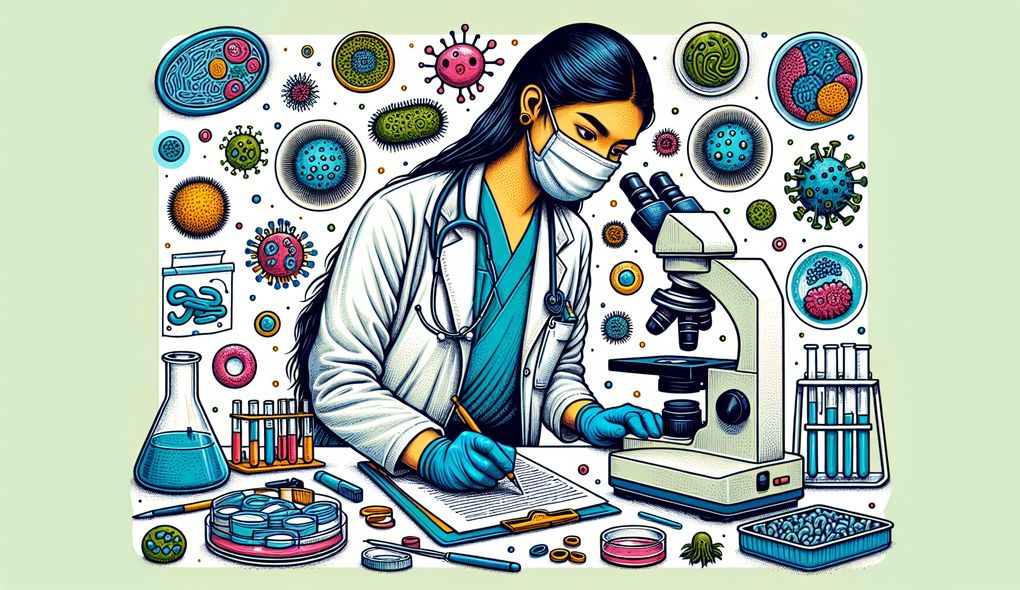How do you approach continuous quality improvement in infection control?
INTERMEDIATE LEVEL

Sample answer to the question:
In approaching continuous quality improvement in infection control, I believe in a proactive and multidisciplinary approach. It starts with staying up-to-date with the latest research and guidelines from organizations like the CDC. I closely monitor infection rates and identify trends or areas of concern. I collaborate with healthcare staff to develop and implement evidence-based infection control policies and procedures. I provide ongoing education and training to ensure staff are knowledgeable and compliant. Regular audits are conducted to assess adherence to protocols, and any deviations are addressed promptly. I also work closely with the epidemiology and public health departments to track infection trends and outbreaks. Finally, I prepare reports to keep hospital administration informed about infection control activities and outcomes.
Here is a more solid answer:
In approaching continuous quality improvement in infection control, I draw upon my strong understanding of microbiology and infectious disease management. I stay informed about the latest research and guidelines from organizations like the CDC. By analyzing and interpreting data on infection rates, I identify trends and areas of concern. I then collaborate with healthcare staff to develop and implement evidence-based infection control policies and procedures. To ensure staff are knowledgeable and compliant, I provide comprehensive education and training, utilizing my ability to explain complex procedures in accessible ways. Regular audits are conducted to assess adherence to protocols, and any deviations are addressed promptly. Additionally, my excellent organizational and communication skills enable me to work effectively with the epidemiology and public health departments to track infection trends and outbreaks. Finally, I prepare detailed reports on infection control activities and outcomes, leveraging my experience with electronic health records and surveillance systems.
Why is this a more solid answer?
The solid answer builds upon the basic answer by providing more specific details and examples related to the evaluation areas mentioned in the job description. It highlights the candidate's strong understanding of microbiology and infectious disease management, proficiency in data analysis and interpretation, ability to educate and train staff in complex procedures, excellent organizational and communication skills, and experience with electronic health records and surveillance systems. The answer demonstrates how the candidate applies these skills in their approach to continuous quality improvement in infection control. However, it can still be improved by incorporating more specific examples or achievements to further showcase the candidate's expertise.
An example of a exceptional answer:
In approaching continuous quality improvement in infection control, I leverage my strong understanding of microbiology and infectious disease management to stay at the forefront of best practices. I actively participate in conferences and professional networks to expand my knowledge and share insights with colleagues. By analyzing and interpreting complex data, including infection rates, patient outcomes, and surveillance reports, I identify patterns and areas for improvement. This data-driven approach informs the development and implementation of evidence-based infection control strategies tailored to the unique needs of our healthcare facility. I foster a culture of continuous learning by providing engaging and interactive education and training sessions, utilizing innovative teaching methods and technologies. Regular audits are conducted with a focus on not only identifying deviations from protocols but also identifying opportunities to enhance efficiency and effectiveness. As a recognized subject matter expert, I collaborate with interdisciplinary teams to develop and publish infection control research papers and guidelines. My strong organizational and communication skills enable me to coordinate and lead multidisciplinary committees dedicated to infection prevention initiatives. To leverage technology, I have successfully implemented electronic health records and surveillance systems, streamlining data collection and analysis. In addition to regular reporting to hospital administration, I actively disseminate infection control outcomes and best practices to healthcare professionals through presentations and publications.
Why is this an exceptional answer?
The exceptional answer further enhances the solid answer by providing additional details and examples to showcase the candidate's expertise and achievements in the evaluation areas mentioned in the job description. It highlights the candidate's proactive approach to continuous learning through participation in conferences and professional networks, as well as their involvement in research and guideline development. The answer also emphasizes the candidate's leadership skills, ability to coordinate multidisciplinary teams, and successful implementation of electronic health records and surveillance systems. By demonstrating a comprehensive understanding and application of their skills, the candidate sets themselves apart as an exceptional candidate for the Infection Control Nurse role. However, there is still room for improvement by incorporating more specific examples or measurable outcomes related to the candidate's past experiences.
How to prepare for this question:
- Stay updated with the latest research, guidelines, and best practices in infection control, particularly from reputable organizations like the CDC.
- Develop a strong foundation in microbiology and infectious disease management to better understand the underlying principles of infection control.
- Familiarize yourself with data analysis and interpretation techniques, as data plays a crucial role in identifying trends and areas for improvement.
- Hone your skills in educating and training others, particularly in complex procedures, to effectively disseminate infection prevention knowledge.
- Practice your organizational and communication skills, as they are essential in coordinating and leading infection control initiatives.
- Gain experience with electronic health records and surveillance systems, as they are commonly used for data collection and analysis in infection control.
- Consider participating in conferences, joining professional networks, and engaging in research to expand your knowledge and demonstrate your commitment to continuous learning.
What are interviewers evaluating with this question?
- Strong understanding of microbiology and infectious disease management
- Proficiency in data analysis and interpretation
- Ability to educate and train staff in complex procedures
- Excellent organizational and communication skills
- Experience with electronic health records and surveillance systems

